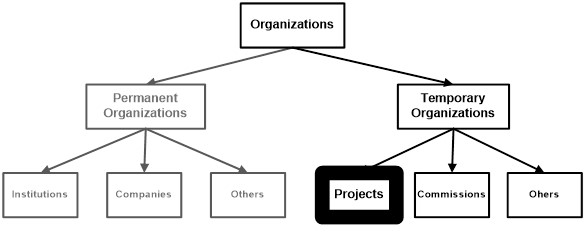Let’s talk about public projects!
SERIES ARTICLE
By Stanisław Gasik
Warsaw, Poland
Introduction
In previous issues of PM World Journal, we devoted some time and space to programs (Gasik, 2023b, 2023c, 2023d). Now let’s take a look at the second major aggregate of projects, the portfolio. In order to properly construct a portfolio – of course within the framework of the authorization granted to given public organizations – you need to know what values are important when building it.
Intersectoral differences in the methods and criteria used to select projects and project programs for implementation are due to differences among sectors as a whole and differences among organizations belonging to these sectors. A project is a type of organization (Figure 1), and therefore inherits its characteristics, including values and intersectoral differences. Therefore, we will begin this article with an analysis of intersectoral value differences.

Figure: Projects as organizations (source: Gasik, 2023a)
Intersectoral objectives differences
It is believed that money is the most important value in the activity of the private sector. Yes, the reason for setting up businesses in the vast majority of cases is the desire to improve one’s financial situation and therefore material opportunities. Recently, there has been more and more talk about Corporate Social Responsibility (CSR), i.e. taking into account the impact on society and the natural environment in the activities of private companies. Ethical aspects are taken into account and good working conditions are ensured. However, since private companies for their existence, operation, and compliance with CSR recommendations always have to engage resources for which they are responsible, there is a limit to achieving these goals. This limit is financial capabilities, which in particular determine the level of taking into account CSR. Hence, the dominant goal of private companies is to ensure the appropriate level of financial resources, resulting primarily from the company’s activities. Projects implemented by private sector organizations should directly or indirectly contribute to the company’s and its owner’s financial success.
The situation is different in the public sector (and to some extent in the third sector, i.e. Non-Governmental Organizations, NGOs). Most public organizations are established to achieve specific objectives related to society. The state and the government can also establish or acquire companies whose purpose is to provide financial income, but they only indirectly affect the implementation of social goals. Increasing the financial status of the administration is not the final objective of public project implementation. And business activity is not the main source of income for public administration. Even if a populist government wants to win the acceptance of new voters through financial transfers, most of the state’s revenue comes from other sources – primarily taxes. For these reasons, we will not deal with state-owned commercial organizations in the remainder of this article.
That is, private companies may have social goals in their functioning, and public organizations may have financial goals – but in both cases, these are secondary goals.
More…
To read entire article, click here
Editor’s note: This article series is related to the management of public programs and projects, those organized, financed and managed by governments and public officials. The author, Dr. Stanisław Gasik, is the author of the book “Projects, Government, and Public Policy”, recently published by CRC Press / Taylor and Francis Group. That book and these articles are based on Dr. Gasik’s research into governmental project management around the world over the last decade. Stanisław is well-known and respected by PMWJ editors; we welcome and support his efforts to share knowledge that can help governments worldwide achieve their most important initiatives.
How to cite this paper: Gasik, S. (2023). On public projects’ values. Let’s talk about public projects, series article, PM World Journal, Volume XII, Issue V, May. Available online at https://pmworldlibrary.net/wp-content/uploads/2023/05/pmwj129-May2023-Gasik-On-public-projects-values-2.pdf
About the Author

Stanisław Gasik, PhD, PMP
Warsaw, Poland
![]()
Dr. Stanisław Gasik, PMP is a project management expert. He graduated from the University of Warsaw, Poland, with M. Sc. in mathematics and Ph. D. in organization sciences (with a specialty in project management). Stanisław has over 30 years of experience in project management, consulting, teaching, and implementing PM organizational solutions. His professional and research interests include project knowledge management, portfolio management, and project management maturity. He is the author of the only holistic model of project knowledge management spanning from the individual to the global level.
Since 2013, his main professional focus has been on public projects. He was an expert in project management at the Governmental Accountability Office, an institution of the US Congress. He is the author of “Projects, Government, and Public Policy,” a book that systematizes knowledge about government activities in the area of project management.
He was a significant contributor to PMI’s PMBOK® Guide and PMI Standard for Program Management and contributed to other PMI standards. He has lectured at global PMI and IPMA congresses and other international conferences.
His web page is www.gpm3.eu.
To view other works by Dr. Gasik, please visit his author showcase in the PM World Library at https://pmworldlibrary.net/authors/stanislaw-gasik-phd-pmp/









